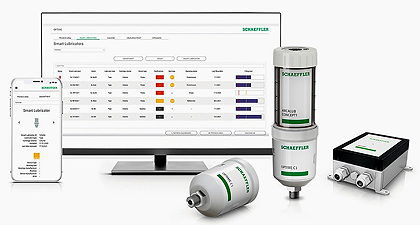Relubrication errors are one of the main reasons for rolling bearings failing, but manual relubrication is still the norm in many companies. Although automatic lubricators are a big improvement, they still rely on manual, route-based monitoring.
Schaeffler claims that its new IoT-based system solves this problem. It integrates with an app to prevent incorrect lubrication as a result of using too much or too little lubricant, applying the wrong or contaminated lubricant, lubrication channels becoming blocked, or installations running out of lubricant.
A battery-powered device, containing a communication module and a temperature sensor, is screwed onto a Schaeffler Concept 1 automated lubricator. Several of these lubricators can connect automatically to form a mesh network that captures and computes key operating data – such as the number of days until the next lubricant refill – and sends this via the gateway to Schaeffler’s cloud and on to an app. It takes less than two minutes to install the components on a lubrication point and to configure them via the app.
Dozens of lubrication points on pumps, fans, compressors, conveyors and other machinery can upgraded rapidly and removed from manual inspection schedules. Personnel only need to visit to the lubricators when they actually need maintenance.

Schaeffler says its new automated lubrication system will simplify lubrication management and end the need for manual checks
The system communicates via the Optime app, a Web-based dashboard, or, if preferred, the user’s own software, giving them an overview of all lubricators that have critical fill levels or lubricant supply problems. The temperature sensors provide an overview of any lubricators that are running too hot.
The open system includes an API that enables it to exchange data with other maintenance tools.
Schaeffler: Twitter LinkedIn Facebook

